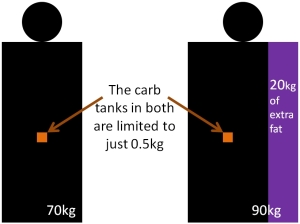
Originally published here on 6-Apr-2014 at www.Enerzal.me
Note: I no longer believe that we need to consume carbohydrates in order to burn fat
In my earliest blogs I spoke to you about food nutrition groups and then about the fuel you get from some of them. Numerous questions from both athletic and sedentary friends over the weeks since then have prompted me to chat with you today specifically about handling what I call our ‘premium fuel’ – carbohydrates.
You need your largest intake of calories (energy, fuel) from carbs and yet managing them without attention can also result in a lot of unattractive fuel storage – as fat!
I would like to help you handle the issue better by breaking it into 2 parts:
(i) understanding the problem and (ii) managing the problem.
Understanding the problem
If you are an ‘average adult male’ then the most you can hold in terms of carbohydrates in your body is 500g. For simplicity, you can think of 400g being stored in your muscles (muscle glycogen) and 100g in your liver (and there’s also a tiny amount swishing around in your blood as glucose).

This means that if you were 70kg before the prosperity bug hit you and you gained 20kg of fat, your ability to store carbohydrates when you’ve reached 90kg is still about as much as it was before – 500g. (Interestingly, however, if that 20kg weight gain was primarily muscle, the ability to store carbohydrates in those muscles will increase by adaptation – because to maintain those muscles through their exercise also needs carbohydrates as fuel. That increase will only be in fractions of kilograms though!)
All this I’ve told you is about the static picture – your capacity to hold carbohydrates as fuel. But what happens to you dynamically over time?
Immediately after your activity (e.g. exercise) your carbohydrate tank has emptied partially. So, if you consume carbohydrates, you will top up the tank. Great! But, and this is where things go awry, what if you consume more carbohydrates than are required to fill up your tank? Well, I’m afraid, I have to bring this bad news to you – it turns into fat. Because of where we’ve all come from (our ancestors needed to store as much fuel as possible to prepare themselves for when their next unknown, possibly meagre, meal might come from) that extra glucose-turned-to-fat is deposited and stored in your body. And, the fat storage tank has near unlimited capacity, so to speak, so it isn’t going to happily exit your body or get magically washed away.

The fear inducing suggestions you hear like “don’t eat rice, don’t eat bananas – you’ll become fat” come from this bit of science (or maths!). But, to understand and follow them intelligently needs a little bit more awareness than “wear your seat belt” (which also, shockingly, in India, people rarely do). The truth is that neither rice nor bananas contain any fat to write home about – instead, they are actually fantastic sources of carbohydrates. Eating them when your carb tank is full is what causes the problem, not eating them per se.
Managing the problem – Part 1 – Avoiding going into overspill
If you live a sedentary life, and eat regular meals, it’s highly unlikely that you ever come close to emptying your carbohydrate tank. The reason is that you would need to run about 30km in order to empty a previously full tank. Therefore, for you, topping up the carbohydrate tank is a case of avoiding going into overspill as that would lead to fat storage. Unfortunately, prescribing low carbohydrate fad diets is also risky as many of the essential nutrients we receive are from sources that are carbohydrate sources. So, eating your carbohydrates at a time when the tank is not full is important, and avoiding carbohydrates when the tank is full is also critical. That fancy zero fat fruit yoghurt you picked from the dessert selection after a big dinner (= carb tank full) is high in sugars (sucrose, fructose, lactose), carbohydrates that will become fat on your body! Solution? Saving it for after your morning walk will benefit your body.
Managing the problem – Part 2 – Eating enough so that your carb tank is rarely empty
If you live a highly active life, perhaps as a recreational endurance athlete like many of my friends do, then too do you need to watch your carbohydrate intake. On the days around your tough workouts (in the run up to, and then soon after) you need to ensure that you have premium fuel. Why? If you remember, in my previous blog, I spoke about how “fats burn in the flame of carbohydrates”. With your carb tank reaching near-empty levels, your body will not burn the fat you might have significant quantities of ready to be used as fuel, because carbohydrates are also required to be used as fuel at the same time. In fact, if you are an endurance athlete, you will be unable to move your limbs if you empty your carb tank – you will have “bonked” or “hit the wall”! That’s a reason why the sports hydration drink Enerzal contains glucose at the right level of concentration so that it can be quickly absorbed into your body. (There are specific cases when you may want to train with your tank near empty for endurance sports, but that should not be a regular event.)
Similarly, you will also feel lethargy in the gym if you did not eat balanced meals after your previous bout of strength training and you’ve been living a reasonably active life in-between. In your case the problem is solved by eating enough so that your carb tank is rarely empty.
I lead a fairly normal urban life with only moderate amounts of exercise. These days, I eat rice for breakfast, lunch and dinner every day! I don’t fear that I will get fat from that. I also snack on bananas 3-5 times a day at times when it is appropriate to do so! I appreciate that keeping my carb tank empty will make the time I dedicate to exercise unproductive or inefficient, and overloading it mindlessly will also nudge me in the direction of fat gain. It is a delicate balance that needs a small amount of mindfulness. I think I have learned how to handle my premium fuel. You could too!
Puru
Dr Purnendu Nath spends his waking hours focusing on helping individuals and organizations reach their goals, to make the world a better place. He speaks, writes and advises on topics such as finance, investment management, discipline, education, self-improvement, exercise, nutrition, health and fitness, leadership and parenting.



[…] micronutrients are often more insidious. Excesses in the macro nutrients are easy to spot – fat gain is an easy one. As are macronutrient deficiencies – more often fat gain than fat loss is a […]
LikeLike
[…] Other than emotional reasons, a special event, a childhood favourite, there may be other times when it might be OK to eat dessert. It’s usually not when you’ve just had a heavy meal. My wife stopped offering me dessert after dinner. […]
LikeLike
[…] have talked about our ancestors numerous times in the past (see here, here and here) and the topic I typically address when I bring them to the present, from the distant past, is […]
LikeLike
Great post. Can you please inform
1) 500 gm of carbohydrate storage is based on what source
2) Do we maintain weight at if we consume only 500 gm of carbs? at what level of carb we lose weight?
LikeLike
Dear Anthony
1) the source does not really matter… the storage is in your liver and muscles
2) you lose weight if you have a calorie deficit (energy output > energy input). You can be eating more than 500g of carbs a day and losing weight or eating much less than that and gaining weight! There is energy in fat and protein too. Your activity levels versus your total calorie consumption will be the first order effect.
Regards
Puru
LikeLike
I read somewhere that first energy source for body is carbs, so if carbs are available they will burn first. So is it possible that if one keeps carbs to under 100-200 gm in daily diet and increase protein and fat and of course exercise then it should help in losing weight.
Essentially one forces the body to burn some fat by providing only minimal carbs. Is this correct according to you?
LikeLike
You need some carbs, in order to burn the fat… or you won’t be able to move your body AT ALL! It’s best to make small, sensible, safe and healthy adjustments and be patient. One doesn’t become fat overnight… and so becoming slimmer is also a task that should be taken with sufficient time for execution.
LikeLike
Puru, although I appreciate your post and your visualization of one’s body as a storage tank, I feel compelled to point out that it is silly of you to suggest a person would not be able to move their body without consuming carbs. A quick google search would show more than anecdotal evidence of many fat-adapted athletes who are thriving on less than 50g carbs a day.
LikeLike
I agree with you!
I run regularly at the end of near-24-hour fasts myself…
I think the intensity needs to be adjusted by a newbie… until the body is adapted to the ketosis… for doing higher intensity sport (since the lypolysis will be a slower process than the process of energy provision from glycogen).
For the uninitiated, the wall is a very real thing.
Thank you for your comment.
LikeLike
[…] the next few articles to come, I will chat with you specifically about topics such as ‘fine tuning premium fuel intake‘, ‘inclusion and exclusion‘, and ‘what to do about dessert‘. They […]
LikeLike
[…] quality factory bulk processed potatoes deep fried in (reheated) animal fat. All consumed when his glycogen tank is fantastically full already. There’s almost nothing good about that snack. A recipe for […]
LikeLike